Cory Booker’s Magic: Hope, Inspiration and Service
Written by Tony Mussari
Edited by Kitch Loftus-Mussari
Copyright 2012
Mussari-Loftus Associates
All Rights Reserved
The Face of America Project
faceofamericawps.com
Mr. Booker, born April 27, 1969, is still the energetic youngster, full of optimism and eloquence. New York Times
The Man
Cory Booker’s magic is deeply rooted in his optimism, his faith, his willingness to serve, his courage to get out of bed on those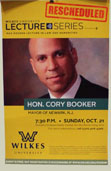 days when it would be more comfortable to hide his head under his pillow.
days when it would be more comfortable to hide his head under his pillow.
Booker is a man of dreams, a man of hope, a man of possibilities, and a man of vision.
Where cynics see an ugly empty lot, he envisions an urban garden.
When the “Henny Pennys” of his city see the markings of gloom and doom written on the walls of deteriorating buildings, he finds a way to convert the decaying structures into buildings with a purpose.
Energized and inspired by people like Mrs. Virginia Jones, affectionately known as the tenant lady with an indefatigable will and a determination to serve others, the big man, with the big brain and the infectious smile goes about the business of turning Newark around one problem at a time.
 On this October weekend, he was in our hometown to share his message at the Dorothy Dixon Darte Center for the Performing Arts on the Wilkes University campus. The occasion was the 31st Annual Max Rosenn Lecture in Law and Humanities.
On this October weekend, he was in our hometown to share his message at the Dorothy Dixon Darte Center for the Performing Arts on the Wilkes University campus. The occasion was the 31st Annual Max Rosenn Lecture in Law and Humanities.
The event began with polite applause. It ended with a standing ovation. Everything in between was a kind of poetry that reflected the light of Cory Booker’s heart of gold, and his infectious enthusiasm for his family, his friends, his city, and his country
The Message
What follows here are 20 starred thoughts from Cory Booker’s Rosenn Lecture. They are taken from the 16 pages of notes I took during his presentation:
1. Sometimes you are on the go, and you forget to be in the present;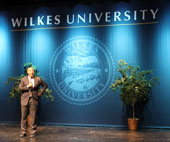
2. Children are never good at listening to their parents, but they are never shy about imitating them; (Quoting James Baldwin)
3. Anybody can be great in a moment, but real greatness is found in people who get up every day and perform consistent acts of goodness, decency and kindness;
4. My grandfather told us to fall in love with America;
5. Look at the night and see the stars. Remember that light, energy and brilliance cannot be destroyed;
6. The common way people give up their power is by not realizing they have it; (Quoting Alice Walker)
7. I am an American. I have privileges and obligations;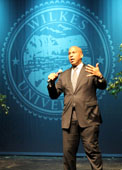
8. The world you see outside you is the world you see inside you;
9. Power is a vision…an oasis of hope and an island of possibility;
10. We have a choice between power and surrender;
11. We have a choice to show up and not be distracted;
12. The greatest disease is sedentary agitation;
13. Even when there was no you, this woman (Mrs. Virginia Jones) fought for you. This woman worked for you;
14. You are the physical manifestation of an act of love;
15. If you want to go fast, go alone. If you want to go far, go together; (African proverb)
16. We are all caught in an inescapable fabric of destiny;
17. We need light from goodness and kindness;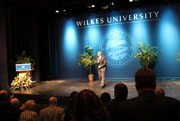
18. We must not get into the cynicism of negativity. We must come together and give testimony to the achievement of the possible;
19. We have a terrible way of dealing with problems. We will pay $100 on the back end to fix them, but we refuse to pay a few dollars on the front end to prevent them;
20. Show me a problem in America, and I can find an innovative program to fix it.
Mayor Booker’s ideas are hopeful and positive. His credentials are impeccable, Stanford, Oxford University and Yale Law School. His leadership style is welcoming, personal and hands on. His energy levels rival Vesuvius.
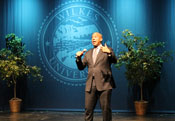 He has known both success and failure, and he interprets criticism as an opportunity to learn.
He has known both success and failure, and he interprets criticism as an opportunity to learn.
Watching him tell his story, I got the impression that he is confident yet humble, compassionate not confrontational, hopeful not cynical. He has a great sense of humor, and most of the jokes he tells are self-deprecating.
He is a grateful man. Throughout his presentation he thanked others for the opportunities he had had and his successes. Again and again, he mentioned the incredible contribution of his parents and his grandfather. Quite frankly, I admire that quality.
Kitch and I had three interactions with the mayor. The first time he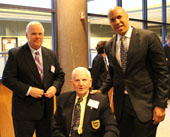 was gracious when we asked him if he would have his picture taken with Attorney Joe Savitz. The second time he honored a request to have his picture taken with Kitch. The third time was the most insightful moment. It happened at the end of his lecture. I raised my hand to ask a question and he acknowledged my request. Then someone in his entourage gave him the sign to end the presentation.
was gracious when we asked him if he would have his picture taken with Attorney Joe Savitz. The second time he honored a request to have his picture taken with Kitch. The third time was the most insightful moment. It happened at the end of his lecture. I raised my hand to ask a question and he acknowledged my request. Then someone in his entourage gave him the sign to end the presentation.
He walked across the stage to align himself with the place where I was standing, and he announced to the audience that this would be the final question. Then with a big smile on his face he looked at me and said, the pressure is on you sir. This is the last question.
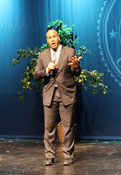 The essence of my question was about the importance of education in the Booker formula for reclaiming our country’s future.
The essence of my question was about the importance of education in the Booker formula for reclaiming our country’s future.
When I finished he surprised me and everyone in the room with words that went something like this: Thank you and God bless you sir for asking that question.
The sweet sound of spontaneous applause filled the room, and Mayor Cory Booker went into overdrive.
Once again, he told his story in a personal. non-partisan, non-inflammatory, thoughtful way. Using data from a McKinsey research report, he divided schools into two categories; those that serve students with a high level of education, and schools that do not offer students a high level of education. He was very specific about the responsibility we have to educate all of our children. He openly admitted that he is a big advocate of charter schools and mentoring programs. On the issue of faith based education, he was candid. “I don’t care how you pray, I care how you serve.”
don’t care how you pray, I care how you serve.”
Most impressive was his reluctance to make teachers scapegoats.
The last words recorded in my notes to come out of Cory Booker’s mouth came straight from his heart. In the end, what matters most is what you do for other people.
Pulitzer Prize winner Ernest Becker believed that man is driven by an essential dualism. He needs to be a part of something and to stick out. He has a burning desire to count for something. I think that’s an insight into Cory Booker the man, the mayor and the motivator. He is an example of good, a force for change and a model of participation.
As I left the Dorothy Dixon Darte Center, I thought to myself, every America city has at least one and perhaps several Cory Bookers. If we want a better future for our country, we need to find Mayor Booker’s male and female counterparts and partner them with the Virginia Jones of our world. That’s what America at its very best is, and that’s what the face of America is on its best day.
The Annual Max Rosenn Lecture in Law and Humanities is a first class community event. Mayor Cory Booker and his message of hope, inspiration and service lived up to that tradition. It honored the legacy of Judge Max Rosenn who believed that elected officials must maintain a high standard of responsibility and service to the citizns they represent.
Please provide feedback to:
tony.mussari@gmail.com